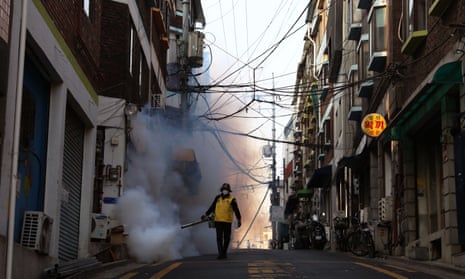South Koreans are famously nonchalant about North Korean nuclear weapons. Bewilderingly to the rest of us, they “keep calm and carry on” whenever Pyongyang threatens to turn Seoul into a “sea of fire”. The South Korean approach to Covid-19 could not have been more different.
On 16 January, the South Korean biotech executive Chun Jong-yoon grasped the reality unfolding in China and directed his lab to work to stem the virus’s inevitable spread; within days, his team developed detection kits now in high demand around the world.
Meanwhile, the South Korean government assumed the virus would hit. Experience with the 2003 Sars epidemic proved useful: existing governmental units in the ministries of health, welfare and foreign affairs, regional municipalities and the president’s office were mobilised. As a result, South Korea has been effective in controlling the nation’s mortality rate not through travel bans but instead through widespread rigorous quarantine measures and testing, now even exporting domestically produced test kits – such as the 51,000 diagnostic products sent this week to the United Arab Emirates.
Most importantly, South Korea immediately began testing hundreds of thousands of asymptomatic people, including at drive-through centres. South Korea employed a central tracking app, Corona 100m, that publicly informs citizens of known cases within 100 metres of where they are. Surprisingly, a culture that has often rebelliously rejected authoritarianism has embraced intrusive measures.
On 17 March, a temporary provision entailed a small subsidy of 454,900 South Korean won (£313) a month to cover basic living expenses. The same funding is available to those who are self-isolating, regardless of whether they test positive for the virus. It’s not hugely generous, but provides subsistence for those whose lives are upended by necessary measures such as the ministry of education’s closure of schools.
Other nations would be wise to copy the South Korean model: on 29 February, 700 people tested positive in the primary South Korean outbreak city of Daegu. By 15 March, 41 new cases were reported there.
There is, however, no time for complacency. As expected, based on the continued lack of immunity in the population, on 18 March, the number of cases began rising again, with Seoul now bracing for the worst.
From 16 March, South Korea started to screen all people arriving at airports, Koreans included. South Koreans have universal health care, double the number of hospital beds compared to Organisation for Economic Cooperation and Development (OECD) norms (and triple that of the UK), and are accustomed to paying half what Americans pay for similar medical procedures. At this historic juncture, there has been a general consensus to trust in and respect the advice coming from doctors and scientists.
But it hasn’t all been smooth sailing: church officials south of Seoul were revealed to have sprayed salt water into parishioners’ mouths on the false premise it would stave off the infection. Worse, no one disinfected the bottle’s nozzle, and 46 people from the congregation have already tested positive. Also, despite South Korea’s laudable healthcare apparatus, foreigners living in the country underscore disparities. With “no Chinese allowed” signs on numerous businesses and restaurants, some fear seeking medical advice.
The South Korean model is not without costs. In pre-pandemic days, the nation’s Oscar-winning film Parasite presciently showed the world how the rich can survive by working from home while their children enjoy the comfort of remote learning without worrying about food. These cultural imbalances are not unique to South Korea. Wealthy, independent schools are sending children home equipped with computers, books and musical instruments for remote learning, a situation being partially offered by state-run institutions, if at all.
In cities such as New York where there is now widespread community transmission of Covid-19 it is likely too late to follow the South Korean model. Efforts need to be focused elsewhere, including a wartime-like mobilisation to vastly increase the production of personal protective equipment for healthcare workers and the ventilator machines needed to treat the critically ill.
Oscars in hand, Bong Joon-ho, the director of Parasite, charmed the world on 10 February: “I will drink until next morning, thank you.” A week later, back in Seoul and well before most governments had woken up to the serious challenge they faced, he had already changed his tone, promising to “wash [his] hands from now on, and participate in this movement to defeat coronavirus”.
Alexis Dudden is professor of history at the University of Connecticut. Andrew Marks is a doctor and chair of physiology at Columbia University
